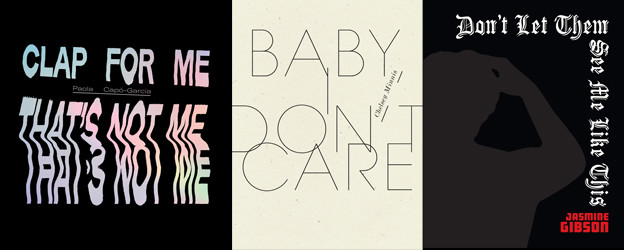
Clap, baby: like this
Kenna O'Rourke

Kenna O’Rourke takes another look at three 2018 poetry titles.
Clap for Me That’s Not Me, Paola Capó-García (Rescue Press, 2018)
“Sometimes I just want to be Julianna Marguiles’s lipstick moonlighting as Christine Baranski’s blazers and chunky jewelry in an effort to understand the legal system and its merits,” writes Paola Capó-García in her debut collection. Capó-García’s methods are relatable: filtering a fucked-up world through too much TV, too much time on the internet, too many music videos (“I had great ambition to become a video girl a classy one the kind that dances with her mouth closed”). There are almost too many funny snippets to keep up — “It’s only a matter of time before our heroine experiments with bangs”; “It’s amateur hour in my jeans right now”; “I kiss this thing goodnight I say goodnight, sassy latina manifesto” — but there are just as many moments of pause (dissections of misogyny, homophobia, diaspora-based loss) to dwell in. Capó-García deftly writes into being a portrait of modernity: “I’m lactose intolerant but sometimes I drink whole milk to fuck with the system.”
Baby, I Don’t Care, Chelsey Minnis (Wave Books, 2018)
Chelsey Minnis’s Baby, I Don’t Care is decadent and deranged, a color story of burnt orange and diamond and wine, a “meat locker full of rubies.” The speaker of these short, punchy poems — indebted, Minnis notes, to Turner Classic Movies — is the kind of absurd upper crust that makes the Real Housewives franchises so popular, with a 1920s-ish speech coach. “Someone can’t help if they’re an immoral princess,” she cries, swimming in a pool of money, gemstones, and fleas. Increasingly lavish demands give way to foul murder plots, the speaker living out a sort of dark rich-man’s-mistress-turned-unhappy-wife narrative; her facility for snippy remarks becomes the one constant from line to line: “There’s a pretty good chance I love you, / but I’ll have to take it up with my board of directors.”
Don’t Let Them See Me Like This, Jasmine Gibson (Nightboat Books, 2018)
In Don’t Let Them See Me Like This, organs, cum, skin, and worn bodies are tied together by the ruling force of late capitalism. The systems that dominate society entwine with the endocrine system, creeping into intimate spaces: “an invisible hand touching me in the shower, me moaning into your mouth”; “Thousands of militants in the streets / Want to cum in ecstasy”; “the mercury in the fish made me horny for you.” Fire in the belly meets fire in the streets, and the speaker of Gibson’s poems navigates relationship dynamics tainted by Western civilization’s lack of love for black women. Gibson carves out a space for leftist disappointment, personal and political, but does not disinvest the narrator of power: “Not waiting for fascism to die / Instead holding my mouth open / And crushing the state under my mandibles.” There is something difficult to name but forceful and alluring about these poems — a quality of tenacity, or is it direct action? — that draws the reader in; as Gibson writes, “I want it / I want ‘it.’”